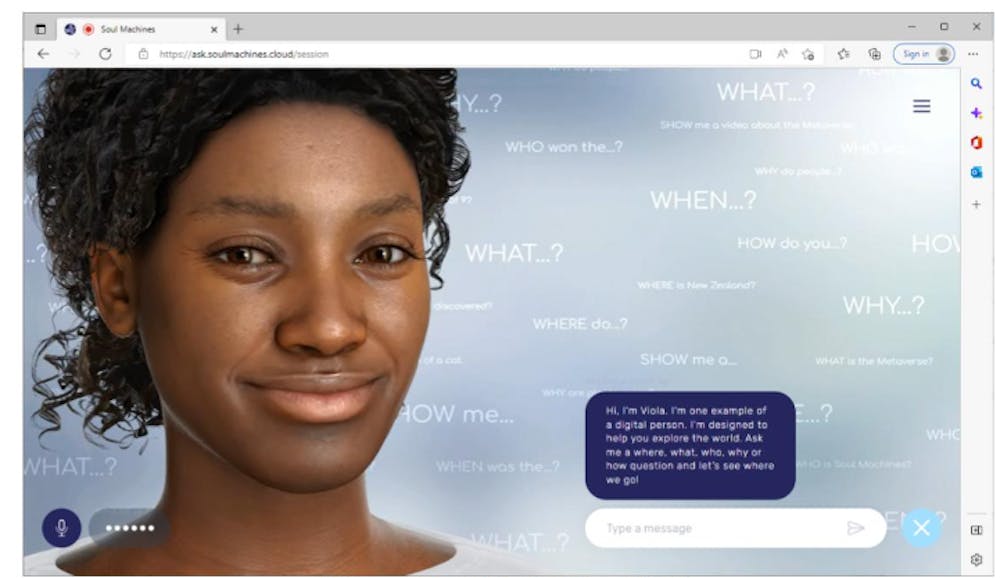Two IU Kelley professors are working to build digital humans, a newly developed AI technology similar to a chatbot that mimics the features of real-life humans.
Alan Dennis, IU professor of information systems in the Kelley School of Business and chair of internet systems, is one of the co-authors of this project. His team has worked with colleagues at Iowa State University and the University of Sydney, Australia for this project. He defines digital humans not as physical robots but as a fully digital form of AI that appears on screens with a realistic, human face.
“You can think of it as a puppet that could be controlled by a human or by AI,” Dennis said. “They can do anything a human can.”
While digital humans can do many human-like activities, Dennis said researchers are still investigating their potential. For instance, Dennis’ team has researched how human consumers react to digital renditions of celebrities in customer service. In one situation, study participants watched a video of a digital celebrity making a mistake and researchers recorded their reaction.
[Related: IU experts recommend professors use ChatGPT as learning tool]
The team concluded participants thought digital celebrity humans were more capable, kind and honest than digital non-celebrity humans. Participants were also less upset when a digital human made a mistake.
In the commercial realm, digital humans can help companies interact with customers abroad by changing how they speak and look to help them communicate more effectively. Dennis said digital humans can also attend Zoom calls as a team assistant to help plan.
Antino Kim, IU associate professor of information systems in the Kelley School of Business and a co-collaborator, said the research process included creating digital humans and observing how people interacted with them. Kim said the team used online platforms such as mTurk and Prolific to find participants in addition to asking IU students.
Kim said digital humans could enhance the quality of customer service by appearing as a likeable and popular celebrity.
“AI agents are super-humans: they don’t get tired, they don’t get bothered, they don’t complain if they work 24/7,” Kim said. “You can essentially run a service that is available 24/7 that is at a very low-marginal cost. You could potentially have an AI agent that has a wide knowledge base.”
Both Dennis and Kim said digital humans can be used in an educational setting. Their team designed digital-human “tutors” that students can customize to present video content and study aides. They said research is still being done to determine whether this approach would help improve students’ learning or supplement harmful stereotypes.
[Related: IU professor awarded $1.8 million for research on particle physics]
“It’s a double-edged sword argument,” Kim said. “Humans gravitate towards easy solutions, this could be a cheap way of solving the issue.”
However, he said it is not so simple because it can cause schools to spend less time and resources in meaningfully furthering diversity. Kim also said digital humans can potentially be a stimulator for misinformation, since they do and say what one wants it to and is easier to believe than other outlets.
Kim said his team has identified legal and ethical concerns when looking to implement digital humans. For instance, when using digital humans to recreate the deceased using past videos, voices and pictures, those alive can give consent, but the deceased cannot. He said society has been slow in developing proper legal infrastructure.
“Technology is going light speed, and we are lagging behind,” Kim said.
Lingyao “Ivy” Yuan, assistant professor of information systems and business analytics at Iowa State University, also collaborated on the project and said digital humans can provide medical training, enable effective communication and eliminate language barriers in movies. In the future, Yuan predicts companies will allow customers to purchase premade digital humans.
[Related: Despite good intentions, MCCSC TVs elicit conflicting feedback]
Yuan also said digital humans could be used to communicate with those with Alzheimer's. While people with Alzheimer's may not recognize a current face, they can remember a face from 20 years ago.
“I de-age my face into a younger kid that could recall the memory from 15 to 20 years ago,” she said. “We have the technology to manipulate the face.”
Yuan said digital humans can also solve the problem of the declining labor market. It will allow workers to work fewer hours, she said. Her team is confident digital humans will become more present in society within the next decade.
“When it’s produced at a scale, it’s going to cut costs for companies,” Yuan said. “It’s inevitable to move forward. It will come with a temporary adjustment, but we will adapt.”




